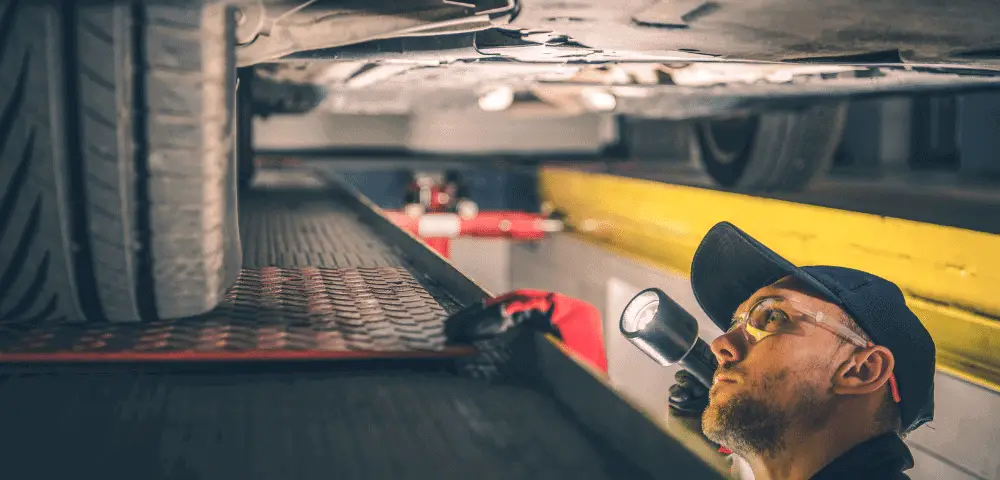You’ll often hear different sounds coming out of your vehicles and sometimes it becomes necessary to deal with them.
Humming noise is a common issue, but is it really dangerous? The short answer is no!
The most common cause is a bearing issue. However, there are multiple other reasons as well.
The following text will take a quick look at all the main reasons behind a humming noise while driving. So, let’s take a look.
16 Main Causes Behind Humming Noise From your Car
Any unusual noise while driving is not pleasant. It feels weird and some people might even believe that there is something seriously wrong with the car.
In most cases, a humming noise while driving indicates minor faults in the car that don’t warrant immediate rectification.
However, it’s always better to sort out any issues in your car as soon as possible to avoid any problems in the future.
There are many reasons why cars make a humming noise.
Understanding them will help you pinpoint the exact problem rather than checking everything in your car only to find out that the problem was something you could have solved with only a few resources.
Here are 16 possible reasons that might cause your car to make a humming noise:
1. A Faulty Wheel Bearing
This is perhaps the most common cause of humming noise.
In most cases, the first thing you need to check is your radial bearings as they tend to go bad, especially if you are a rough driver or offroad frequently.
The radial wheel bearings sustain the most load in any car.
All of the car’s weight along with the vibrations from bumps and potholes. Everything goes through the bearings and it’ll naturally go bad.
The humming noise is the first indicator that your bearings need replacement.
The best way to check it is to jack up your car, put the gear on neutral, and finally rotate your tires with your hands.
If you feel a wobble or humming noise, then it’s time to replace your wheel bearing.
2. Steering Issues
The steering system of your vehicle has a lot of internal components that work together to change your car’s direction.
Sometimes, the pump in your power steering can go bad and create a lot of problems.
A giveaway sign of a bad steering pump is the greater intensity of the humming sound at a cold start.
Oil’s velocity is affected by the temperature and it gets easier for the pump to process it as it gets hotter.
However, a functional pump would operate the same at a cold start despite the high viscosity.
The power steering pump is not the only component that can cause a humming noise.
Sometimes, deteriorating hoses in the steering system also create this noise and disturb you.
Generally, the problem happens due to misplacement and you can often diagnose it by listening to the sounds while rotating the steering wheel to the two extremes.
If the sound changes, then you need to get your hoses checked.
3. Faulty Transmission

In this case, a humming noise while driving will be one of the problems.
You’ll start listening to clunking, erratic shifts, and hissing sounds at the same time.
If you feel that the sounds are originating from the bottom of the floor, then you need to get your transmission checked.
4. Shaft Bearing
A lot of humming sounds are generated from faulty transmission components.
The shaft bearing, responsible for maintaining contact and a seamless transfer of power, is quite important and can go bad with time.
Any damage in that component would result in a humming noise, especially at higher speeds.
5. Alternator
The alternator is responsible for charging the battery of your car and keeping the electrical components including the AC running.
It’s naturally important and any fault in it should be checked immediately.
A humming noise throughout the drive and among the primary indicators of a faulty alternator. So, be sure to get it checked asap.
6. Damaged Cooling System
Just like so many other systems in your vehicle, the cooling mechanism in the car consists of a series of individual systems and components that work collectively to control the temperature.
A damaged cooling pump bearing can create a humming noise.
Any issues in the coolant system can damage a lot of important systems in the car.
Your engine can overheat and damage your gaskets, hoses, and other essential components.
Therefore, you should always ensure that every element of the coolant system works perfectly.
7. Low Transmission Oil
If there’s a shortage of oil in the transmission, it will cause a humming noise.
Regardless of whether your car has an automatic or manual transmission, low oil levels are a serious issue that can drastically affect the overall performance of your car.
If you suspect that the humming noise you’re hearing is due to low oil levels, it’s best to immediately get the problem checked and replace the oil.
8. Worn-out Release Bearing

A worn-out release bearing is the most plausible suspect if the humming noise is heard right after pressing the gas pedal.
It indicates that the bearing has either become too worn out for use or has been damaged in some way or the other.
The best course of action then is to assess the problem and replace the entire cluck kit.
9. Engine Head
It’s also possible that the humming noise is caused by a trivial reason. If you’ve exhausted all other possibilities, then check the engine head and its screws.
Loose screws can cause vibration which sounds a lot like a hum. You’ll simply have to tighten the screws if that’s the case.
10. The Universal Joint Shaft
If you can find out where the humming noise is coming from, you’ll easily be able to identify the source of the problem.
For example, if the noise comes from underneath the car, you might want to get the universal joint shaft checked.
A worn-out or damaged joint shaft can end up creating the hum you hear while you drive.
11. Using the Wrong Tires
Most drivers don’t know that using the wrong type of tires in the wrong weather can end up emitting a humming noise.
This is especially the case for using winter tires during summer. You just have to replace the tires to stop the noise in this case.
12. Wheel Balancing
Needless to say, balancing your car wheels is important for it to operate perfectly.
If the balance of your wheels is out of tune, you’ll most likely end up facing a plethora of problems.
Hearing a humming noise while you drive is one of them.
That’s because unbalanced wheels will vibrate as you drive.
Not only will you experience a bumpy ride, but it will also be extremely uncomfortable for both the driver and the passengers.
Moreover, it will also emit a humming noise. The faster you drive, the more the vibration and noise as well.
It’s best to immediately tackle this issue by taking your car to the closest repair shop and balancing the wheels.
13. Exhaust Problems
If you’ve exhausted all possibilities, it’s possible that your exhaust pipe might be the culprit behind the humming noise.
This problem is rare though but sometimes an exhaust pipe can get loose instead of staying fixed in its place.
As you drive, the pipe moves and ends up touching other components of the car.
14. Worn Rear Axle Reducer
If the humming noise is heard from the back of the car, the fault most likely lies in the rear axle reducer.
The rear axle reducer can be damaged due to low transmission oil.
15. Issues in the Differential
The differential is responsible for ensuring a smooth overall drive and any fault that can lead to several problems down the road.
A low humming noise is among the unusual signs that your differential needs a replacement.
However, the problem is quite uncommon and you should only check it if the humming noise persists despite checking everything else.
16. Uneven Tire Wear

Another problem that may lead to a faint humming noise is uneven wear on the tires. Tire issues are a serious problem that needs immediate attention.
You can check for uneven wear by visibly inspecting your tires or asking a professional to do it if you can’t understand it.
The Best Way to Deal with the Humming Noise Issue
The most common reason why you might be hearing a humming noise can be due to worn wheel bearings.
So it stands to reason that replacing them should be the first course of action you’ll have to take. If the problem persists, try to identify where the noise is coming from in the first place.
From there, you can work out where the problem lies and take steps to fix it. Finally, you can also take your car for a diagnostic test.
A detailed diagnostic test will take a close look at the major components of your car and identify underlying problems that could be causing the noise.
Final Thoughts on the Possible Reasons Behind Humming Noise While Driving
Humming noise while driving is both unsafe and annoying.
The reasons behind them can be any, but the most common one is an issue with your wheel bearing.
Whenever you face this issue, it’s always better to check the most common reason first before proceeding with the complete diagnostic.


